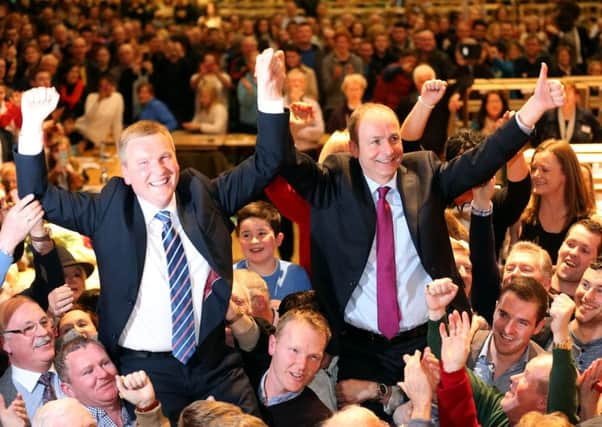No deal in sight as divided Irish parliament prepares to sit


No party has a majority in the Dail and there is no sign of a viable coalition partnership being formed after voters forced a seismic shift in politics in the Republic.
Attempts will be made to elect a new Taoiseach but outgoing ministers have already conceded it will be weeks, possibly two months, before a minority government or a power-sharing alliance could be agreed.
Advertisement
Hide AdAdvertisement
Hide AdOn the back of the massive voter schism, a previously unthinkable alliance between old enemies Fine Gael and Fianna Fail appears to be the only viable scenario.
But that alliance is fraught with difficulties as huge swathes of their memberships hold fast to the bitter civil war animosities borne more than 90 years ago.
Three nominees are to be put forward as head of government - outgoing Taoiseach Enda Kenny, who has held the position since 2011, Micheal Martin, who has led a resurgent Fianna Fail, and Sinn Fein’s Gerry Adams.
With no-one likely to win a majority, Mr Kenny will then visit President Michael D Higgins in Aras an Uachtarain where he will either resign or ask for the Dail to be dissolved, sparking a second election in just over a month.
Advertisement
Hide AdAdvertisement
Hide AdYesterday Mr Adams called on Fine Gael and Fianna Fail to take power, a move which would clear his party’s path to capitalise on being the main opposition.
“Those on hospital trolleys and those sleeping in doorways should not be left waiting while Fianna Fail and Fine Gael jockey for position,” he said.
Tentative discussions have taken place between Fine Gael ministers and groups on the opposition benches in the fortnight since the election but, put simply, the numbers are not there for a stable government.
The stalemate is expected to push Mr Kenny’s party into talks with Fianna Fail on some form of power-sharing.
Advertisement
Hide AdAdvertisement
Hide AdBut Mr Martin’s senior spokesmen have claimed their priority is tackling parliamentary reform and the issues which led voters to elect the most diverse Dail in the country’s history.
Mr Kenny is to propose an all-party committee be set up to agree reform of how parliament works.
Ireland’s Constitution provides for the outgoing Taoiseach and Government ministers to remain in office until the new cabinet is agreed.
There is no time limit on how long caretaker roles can be held but one anomaly is that all ministers must have retained their seats in an election, meaning several positions at the table need to be replaced.
Advertisement
Hide AdAdvertisement
Hide AdMr Kenny has offered limited insight into potential coalitions other than to commit to work with rivals.
He also vowed that any administration his party leads would deal with issues “highlighted and prioritised” by voters during the election - unprecedented homelessness, the debacle of water charges and the Irish Water utility and the overcrowding crisis in the health service.
And while there is little policy difference between the centre-right parties, there is concern in Fine Gael that it would face further voter backlash if it implements difficult reforms and policies, even with Fianna Fail support.
Both parties are also wary of handing the official opposition to Sinn Fein, the third largest party, which has refused to prop up either of them.
Advertisement
Hide AdAdvertisement
Hide AdLabour, the outgoing junior coalition partner which was near wiped out after holding just seven seats, is to support Mr Kenny’s nomination as Taoiseach.
Among those who may yet hold the balance of power in the Dail are Independents, who took 17 seats, and the Independent Alliance, which has six seats and describes itself as like-minded, radical but responsible politicians.
There may also be a small hand to play for the Social Democrats who have three high-profile TDs - Stephen Donnelly, Roisin Shortall and Catherine Murphy - or the Greens who returned to the Dail with two seats.
The sitting will also see the election of a new Ceann Comhairle, a chairman or speaker.
Advertisement
Hide AdAdvertisement
Hide AdThe vote will be in secret and the five candidates are Independent Maureen O’Sullivan, Fianna Fail’s Sean O Fearghail, Fine Gael’s Bernard Durkan and Andrew Doyle, and Sinn Fein’s Caoimhghin O Caolain.